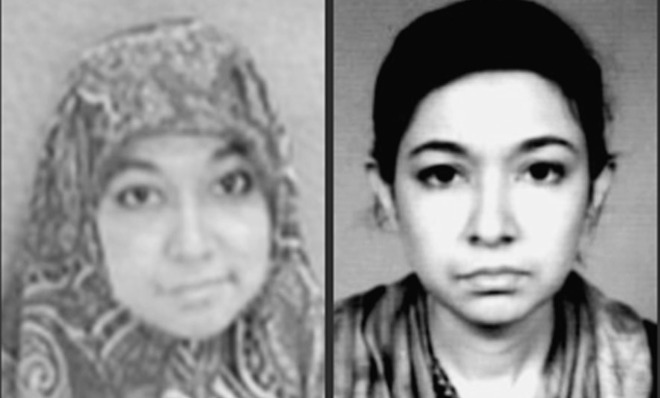Meet 'Lady al Qaeda,' the world's most wanted woman
Why does every jihadi group want the U.S. to free Aafia Siddiqui?

A free daily email with the biggest news stories of the day – and the best features from TheWeek.com
You are now subscribed
Your newsletter sign-up was successful

Two years ago, a group of senior U.S. national security officials received a tantalizing proposal from officials in Pakistan. If the United States would release a Pakistani woman serving a lengthy prison sentence in Texas for attempted murder, Islamabad would try to free Army Sgt. Bowe Bergdahl, who had been missing since 2009 and was thought to be held in Pakistan by Taliban forces.
According to current and former U.S. officials familiar with the proposal, President Barack Obama's national security advisors swiftly rejected the offer. To free the prisoner, Aafia Siddiqui, who is linked to al Qaeda and was convicted in 2010 of attempting to kill Americans in Afghanistan, would violate the administration's policy of not granting concessions to terrorist groups, the officials concluded. It would also put a potentially dangerous fighter back on the street. Siddiqui, 42, who's known in counterterrorism circles as "Lady al Qaeda," has been linked to 9/11 ringleader Khalid Sheikh Mohammed and was once on the FBI's most-wanted terrorists list. Educated in the United States — she studied at M.I.T. and received a doctorate from Brandeis — Siddiqui was arrested in 2008 in Afghanistan carrying sodium cyanide, as well as documents describing how to make chemical weapons and dirty bombs and how to weaponize Ebola. When FBI and military officials tried to question Siddiqui, she grabbed a weapon left on the table in her interrogation room and fired upon them.
Although U.S. officials never seriously considered trading Siddiqui, she has been a perennial bargaining chip for terrorists and Islamist militants who've made her release a condition for freeing a number of American and European prisoners over the years. The militants had repeatedly threatened to execute Bergdahl if Siddiqui wasn't set free. And the Islamic State terrorists who murdered American journalist James Foley last week had demanded Siddiqui's release to spare his life.
The Week
Escape your echo chamber. Get the facts behind the news, plus analysis from multiple perspectives.

Sign up for The Week's Free Newsletters
From our morning news briefing to a weekly Good News Newsletter, get the best of The Week delivered directly to your inbox.
From our morning news briefing to a weekly Good News Newsletter, get the best of The Week delivered directly to your inbox.
(More from Foreign Policy: Found: The Islamic State's terror laptop of doom)
On Tuesday, the Islamic State again demanded her freedom, this time in exchange for a 26-year-old American woman kidnapped last year in Syria while working with humanitarian aid groups. Officials believe the Islamic State is holding at least three more American prisoners. The militants have also insisted upon a $6.6 million ransom for the young American woman, whose family doesn't want her identified. The Islamic State's demands were first reported by ABC News.
While the White House has steadfastly refused to put Siddiqui's release on the table in negotiating for American prisoners, a team inside the Defense Department has proposed trading her for American captives, according to a U.S. lawmaker.
"We are aware of at least one entity in the Defense Department that has developed possible options to trade Siddiqui. And we can say with certainty that the option was weighed for Bergdahl and several others in captivity," said Joe Kasper, a spokesman for Rep. Duncan Hunter (R.-Calif.), a senior member of the House Armed Services Committee and a former Marine who has criticized the Obama administration for not doing more to free American prisoners.
A free daily email with the biggest news stories of the day – and the best features from TheWeek.com

A heated debate over whether the U.S. government should pay ransoms or conduct prisoner swaps in order to free American captives erupted after Foley's murder. The United States, unlike many European countries, doesn't pay ransoms. Some terrorism experts say that Americans are less likely to be kidnapped as a result. But some former prisoners and their families want the government to pony up if doing so will free Americans.
Kasper said the Siddiqui option in Bergdahl's case never reached Defense Secretary Chuck Hagel. "That's a real shame, because right or wrong on trading Siddiqui, all valid options should be explored and exhausted," he said.
(More from Foreign Policy: Steven Sotloff's murder proves the Islamic State isn't interested in negotiating — and never was)
Senior administration officials said they were unaware of any proposal by a Pentagon unit to offer Siddiqui's freedom as part of hostage negotiations. And acquiescing is legally complicated, experts said. President Barack Obama would possibly have to pardon Siddiqui or commute her sentence because the United States and Pakistan don't have a treaty allowing Pakistanis incarcerated in the States to serve out their sentences back home. Experts said that the administration could probably have fashioned some solution, but doing so would have opened the White House to criticism that it was directly negotiating with terrorists.
And yet Bergdahl, for whom swapping Siddiqui was at least briefly considered, was ultimately freed in May in exchange for five high-ranking Taliban prisoners held at Guantánamo Bay, Cuba. That deal was criticized as a concession to militant groups and as a potential security risk. U.S. intelligence agencies two years ago concluded that those prisoners would eventually return to hostilities against the United States, according to a former senior official who helped write the assessment. The prisoners were remaindered to the Qatari government, which is to keep them in custody until next year.
Current and former officials have said that trading the "Taliban 5" for Bergdahl was in line with the tradition of exchanging prisoners in wartime and part of a broader effort to enter into peace negotiations with the Taliban to end fighting in Afghanistan. In that sense, officials have argued, Bergdahl's release was fundamentally different than any proposed swap for Siddiqui.
"I'm not going to get into any alleged internal deliberations and what ideas may have been generated, if any, on this issue," White House spokeswoman Caitlin Hayden told Foreign Policy. "Aafia Siddiqui is serving a sentence of 86 years in prison for the attempted murder and assault of U.S. nationals and U.S. officers and employees in Afghanistan. The United States government, as a matter of long-standing policy, does not grant concessions to hostage takers. Doing so would only put more Americans at risk of being taken captive."
Siddiqui is something of a cause célèbre in Pakistan, where her 2010 U.S. conviction sparked numerous protests. "The reaction to the Siddiqui verdict was front-page news in all the major newspapers," according to a U.S. State Department cable obtained by WikiLeaks. "A number of press articles condemned the U.S. and blamed the verdict on anti-Muslim bias," the cable read, noting that Siddiqui's conviction also "resurrected familiar allegations" that she'd been kidnapped by Pakistani intelligence agencies and the FBI, illegally detained in Afghanistan, and "physically and mentally abused by American soldiers." Some Pakistanis also protested their own government "for failing to do more to secure the return of Siddiqui and for its allegedly muted response to the verdict," the cable read. Her conviction bolstered ongoing internal criticism that the Pakistani government is too close to the United States, which has for years launched drone strikes on Pakistani soil with the consent of the country's leaders.

In Pakistan, a group of militants calling itself the Aafia Siddiqui Brigade has attacked government facilities in order to avenge what they see as her unfair trial and wrongful incarceration. A 2012 bombing of a police van in Peshawar that killed two officers, as well as a 2013 attack on a judicial complex that killed four people and wounded more than 50, were reportedly blamed on the pro-Siddiqui group.
Siddiqui's release has figured in several lower-profile prisoner negotiations, and not just for American citizens. In 2010, the Taliban demanded her freedom in exchange for British aid worker Linda Norgrove. The following year, a top Taliban official offered to swap her for two Swiss citizens who'd been kidnapped in Baluchistan. And al Qaeda leader Ayman al-Zawahiri has called for Siddiqui's release in exchange for freeing American contractor Warren Weinstein, who was kidnapped in Pakistan in 2011 and is now in al Qaeda custody, according to U.S. officials.
(More from Foreign Policy: The Islamic State vs. al Qaeda)
Kasper, the spokesman for Congressman Hunter, doubted that Siddiqui posed a serious risk to U.S. security and suggested that she was mentally impaired and likely incapable of carrying out any of the deadly attacks she may have been plotting when she was arrested. "If done correctly, there might have been ways to make [an exchange] work," Kasper said, adding that the possibility of freeing her for Bergdahl and others has never been properly presented to "the right entity within [the Defense Department]."
That assessment is at odds with former U.S. officials who said that Siddiqui's possible release for Bergdahl was quickly dismissed as unrealistic. But al Qaeda, the Taliban, and the Islamic State don't appear to have gotten the message that the United States will not trade the imprisoned scientist.
In a letter published by ABC News, Siddiqui's family members said they were "very distraught" that her name had been invoked in the latest demands over the 26-year-old American woman held by the Islamic State.
"If the issue is true, we would like to state that our family does not have any connections to such groups or actions," the letter reads. "We believe in a struggle that is peaceful and dignified. Associating Aafia's name with acts of violence is against everything we are struggling for."
The family added, "While we deeply appreciate the sincere feelings of those who, like us, wish to see the freedom of our beloved Aafia, we cannot agree with a 'by any means necessary' approach to Aafia's freedom. Nor can we accept that someone else's daughter or sister suffer like Aafia is suffering."
-
 What to know before filing your own taxes for the first time
What to know before filing your own taxes for the first timethe explainer Tackle this financial milestone with confidence
-
 The biggest box office flops of the 21st century
The biggest box office flops of the 21st centuryin depth Unnecessary remakes and turgid, expensive CGI-fests highlight this list of these most notorious box-office losers
-
 What are the best investments for beginners?
What are the best investments for beginners?The Explainer Stocks and ETFs and bonds, oh my